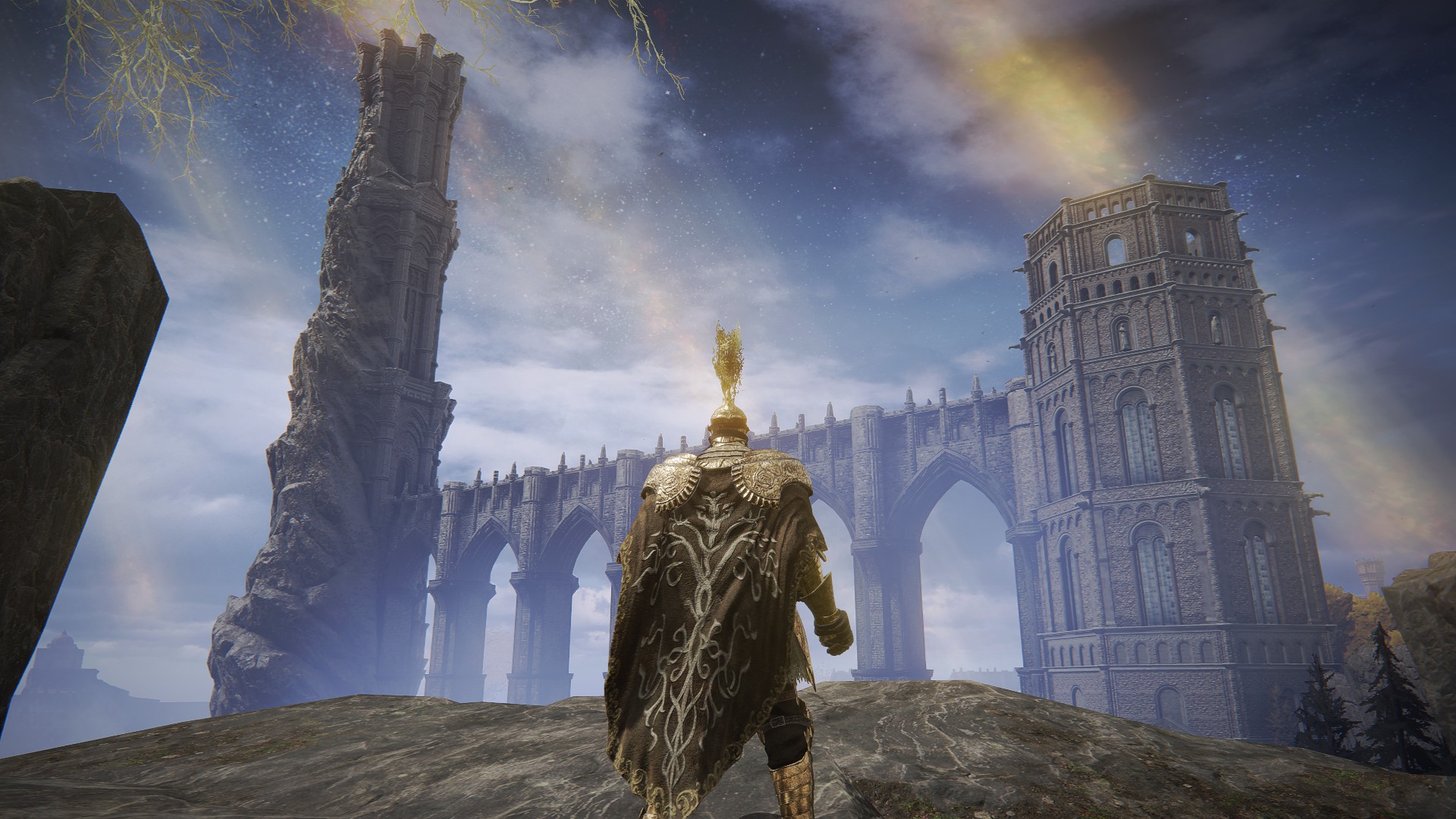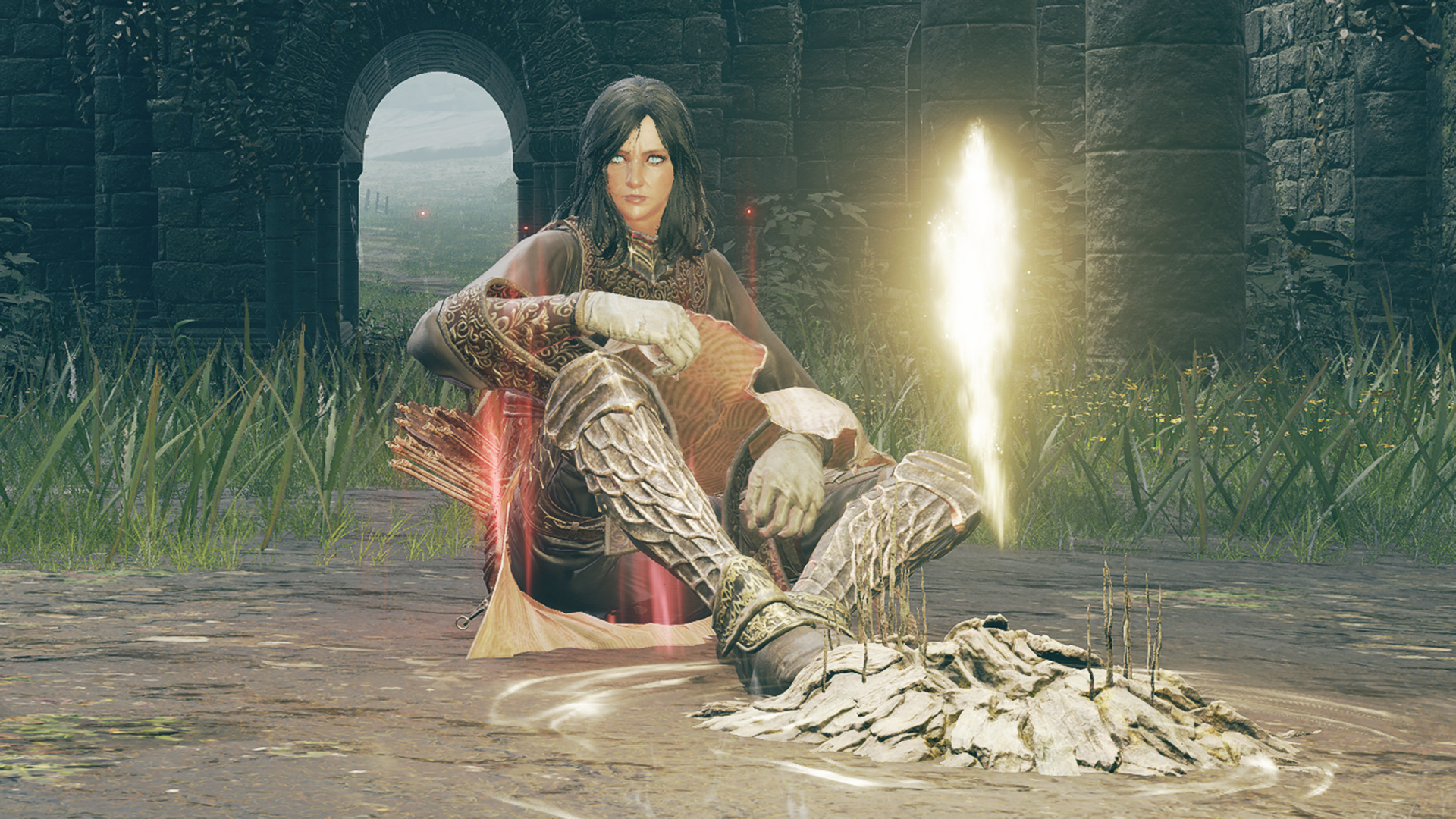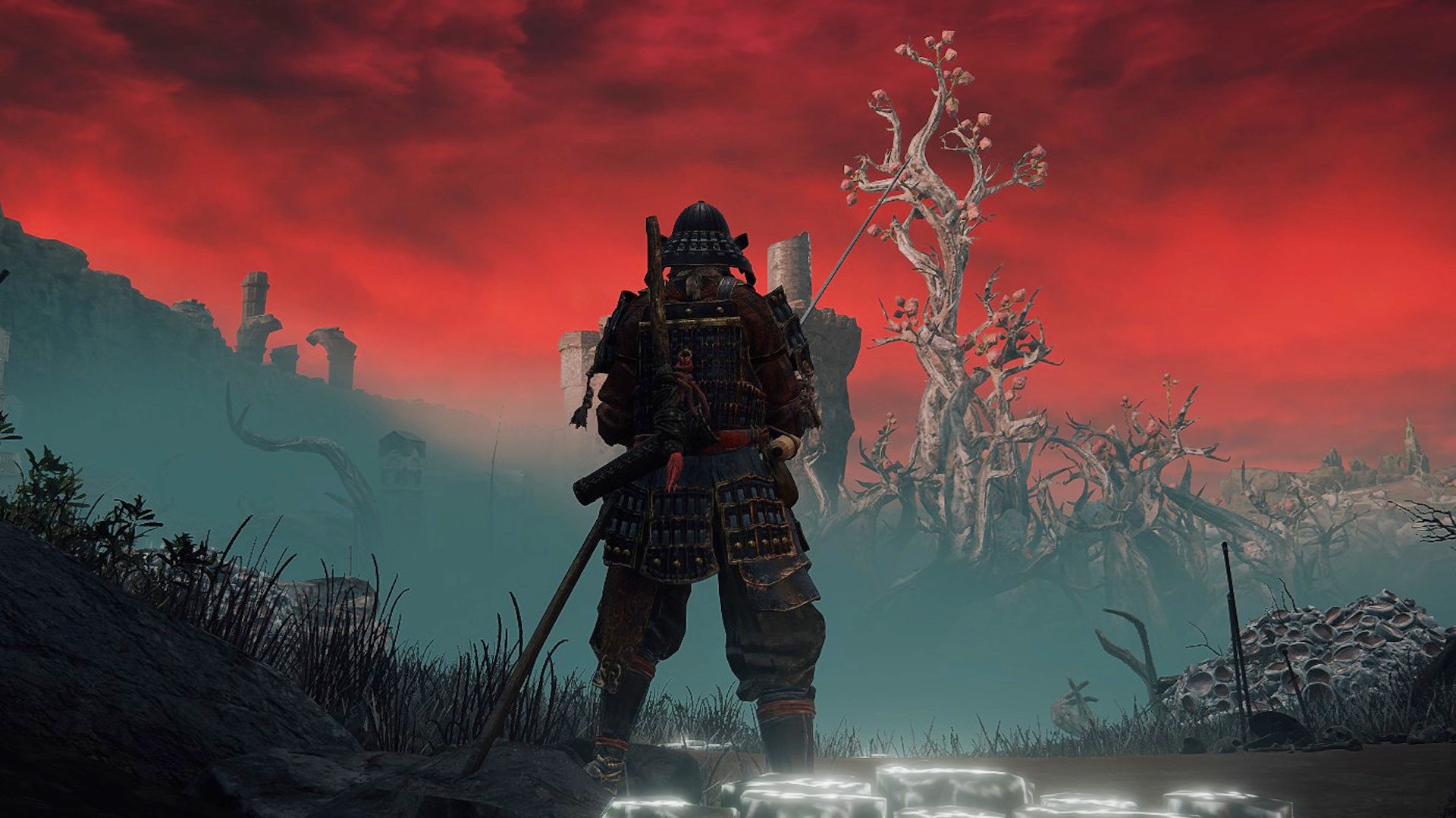The less I try to 'git gud' at Elden Ring, the more I love it
Elden Ring is the perfect opportunity to reevaluate our relationship with virtual worlds.

I am cautiously making my way through a cavern deep underground, the path ahead lit only by the impossible canopy of stars hanging overhead. I have no idea what I'm supposed to be doing in this place—I didn't even know the Siofra River existed until a few moments ago. I can't easily escape to more familiar territory, and everything here wants to kill me and is very good at doing so. So far, so Elden Ring, right?
Right. But. The difference here is me: I'm not hoping to find sweet loot on some withered corpse dangling on the edge of a crumbling monument to forgotten gods, nor am I making an effort to "complete" another area as I carve a destructive route through The Lands Between. I'm here because my curiosity, guided only by a map that's deliberately more evocative than it is instructive, led me here. I don't know what I'll discover down here or what I'll do when I find it, and that makes every shady nook an unexplored corner of my own adventure even if it's a dead end.
It's here that I find myself battling Elden Ring's toughest foe again. You'd expect that to be a huge demi-god riding a tiny horse or a mighty dragon capable of roasting me from above, but in truth I'm fighting a feeling—the feeling that by taking such a casual approach to Elden Ring I'm not playing it the "right" way.
Git gud can git lost
I'm supposed to want to be "good" at games, aren't I? Especially FromSoftware games, famous for their difficulty and the exploits players use to overcome them. I'm supposed to want to efficiently unpick their mysteries, defeat their towering enemies, and then see the credits roll in time to move on to the next big thing the internet wants to talk about. I shouldn't want to spend "unnecessary" time poking around somewhere I don't need to be. If I played for 100 hours and then decided to quit long before seeing the final boss, surely I must've been doing something wrong.
Managing my equipment load in Elden Ring is nothing compared to the weight of expectation resting on my shoulders when it comes to community-driven games like these. Watching talented players storming through places I may never see is fine—it saves me the virtual walk if nothing else—but it's another thing to get stuck and seek a little help, only to discover fan-created guides and wikis have a very different idea of what "a little help" entails.
What build are you aiming for? Well, kinda m- What weapons are you using? I found this powerful staff a while back, is th- Which hands are you holding those weapons in, and how many Smithing Stones have you used on them? Uh, I'll have to ch- Which status effect are you hoping to inflict? Death, I gues- Which phase of the boss fight are you on? Wait, you're telling me there's more than o- Have you tried rolling? Yeah bu-

The game may change—a popular MMO, a chart-topping F2P adventure, a competitive strategy game, whatever disease-riddled world FromSoftware have cooked up this time around—but the pressure remains the same. It's often not enough to play, and for some it's not enough to win: the dominant way of analyzing and discussing games like Elden Ring is all about optimizing. Being efficient. If I'm not interested in breaking the game on a mechanical level, then anything I do achieve often feels like a shoddy approximation of how to do it "properly," judging by the conversations across Reddit and Discord and social media. My time in the Academy of Raya Lucaria, much of it spent dashing around corners and muttering "Pleasepleaseplease don't hit me" under my breath, felt like something best hidden from the internet unless I wanted to see my social media feeds filled with tips on how I "should" have played, regardless of the outcome.
Keep up to date with the most important stories and the best deals, as picked by the PC Gamer team.
There's another way of looking at Elden Ring, though, a less efficient and optimized one, which the game actively encourages. The overworld allows you to be anywhere you can reach, regardless of whether you've earned the right to be there or not. Elden Ring itself doesn't care what I do or when I do it; The Lands Between will still be there, trapped in post-apocalyptic amber. So when a game offers this much freedom, why not choose to be free?
When I started Elden Ring, I vowed to focus on spending time in its world simply for pleasure's sake, even if I don't "do" anything. It's time I stop viewing incomplete achievements as a public list of Things I Haven't Done But Should Have. I instead chose to cherish quiet rides through waterlogged forests and often fatal explorations of the darkest depths for their own sake. I need to give these virtual worlds, these incredible amalgams of art and technology brought into being by armies of talented people, the space to be more than the next game to be conquered.
Pointing the fingers

Although it's not as easy as that, is it? You can't just will the feeling of being surprised into existence. Resident Evil: Village tried very hard to make long-time good guy Chris Redfield look like the villain in his wife-murdering, baby-snatching intro, but as with most attempts to surprise in games, it's clear there's more going on than you've currently been told. It's not shocking behaviour from the hero, it's just a plot point awaiting an inevitable explanation.
It's just as hard for a moment of discovery to spark genuine delight, even if you're ready and waiting to be delighted. These days Final Fantasy 14 instigates time travel and dimension-hopping at the press of a button, even though the convenience of the act can reduce your daring adventures across reality into hunts for the closest Aetheryte and the correct "!" on the minimap.
In contrast Elden Ring is a world of untold possibility, shaped by my own hands. The list of places I never have to visit and things I don't have to do is long, and yet the rewards for doing them can shape the future. I can stumble into conversations and agree to things I don't fully understand, and find myself made to live with the consequences. Characters may turn on me for real, forcing me to kill them before they do the same to me, or they may pass away and leave only a few items of unknown use behind, their death the result of something I did or didn't do, but now have to deal with.
When playing without any outside knowledge these are ongoing changes in a world that does not revolve around me. It's too vast and too ancient to deign to explain itself to a lowly Tarnished. The instant the wider gaming community lays every possibility bare and uploads best-practise videos, all that's left to do is check the final outcome and decide if the reward's worth the effort I have to go through to get it.
Which is why it's always worth asking if there's another way we can approach something as big, as special, as Elden Ring. If there's something more interesting to do here than be strong or right or efficient.
Lost grace discovered
Elden Ring is a lot of things to a lot of people—the culmination of FromSoftware's doggedly unique successes, the latest must-play game everyone's talking about, a great challenge to overcome in the most difficult ways possible, another world's worth of fragmented lore to carefully piece together—but it's also the perfect reminder that we don't need to master or even finish a game to consider our time with it to have been worthwhile.
There are entire decaying cities I've only ever glimpsed from Torrent's back as I've been pelted with frustratingly accurate magical spells from afar or chased by some rotting beast with way too many teeth (often both at the same time, because Elden Ring). There have been times I've tried to outsmart my enemies only to realise too late I'd been so focused on sneaking up on the festering beast ahead I hadn't even noticed the one dropping in from above. I may never know if I was inches away from the beginning of another mysterious quest, one left turn away from a sprawling dungeon, or about to collect something precious when I died—maybe it was none of those things and I simply saved myself a lot of bother by dropping dead and wandering off somewhere else. But the memories of these unplanned, inefficient encounters that rarely pan out shine all the brighter for not trying to force these self-made events to serve a more productive purpose.
I still don't know where I'm going or what Elden Ring will have waiting for me when I get there, but I had fun, and that's enough.

When baby Kerry was brought home from the hospital her hand was placed on the space bar of the family Atari 400, a small act of parental nerdery that has snowballed into a lifelong passion for gaming and the sort of freelance job her school careers advisor told her she couldn't do. She's now PC Gamer's word game expert, taking on the daily Wordle puzzle to give readers a hint each and every day. Her Wordle streak is truly mighty.
Somehow Kerry managed to get away with writing regular features on old Japanese PC games, telling today's PC gamers about some of the most fascinating and influential games of the '80s and '90s.

